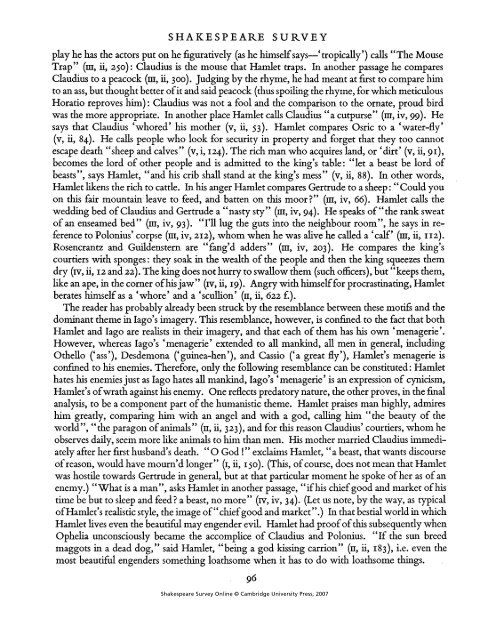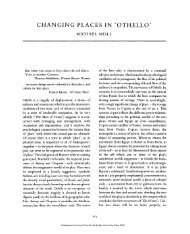the individualization of shakespeare's characters through imagery
the individualization of shakespeare's characters through imagery
the individualization of shakespeare's characters through imagery
You also want an ePaper? Increase the reach of your titles
YUMPU automatically turns print PDFs into web optimized ePapers that Google loves.
SHAKESPEARE SURVEY<br />
play he has <strong>the</strong> actors put on he figuratively (as he himself says—'tropically') calls "The Mouse<br />
Trap" (m, ii, 250): Claudius is <strong>the</strong> mouse that Hamlet traps. In ano<strong>the</strong>r passage he compares<br />
Claudius to a peacock (m, ii, 300). Judging by <strong>the</strong> rhyme, he had meant at first to compare him<br />
to an ass, but thought better <strong>of</strong> it and said peacock (thus spoiling <strong>the</strong> rhyme, for which meticulous<br />
Horatio reproves him): Claudius was not a fool and <strong>the</strong> comparison to <strong>the</strong> ornate, proud bird<br />
was <strong>the</strong> more appropriate. In ano<strong>the</strong>r place Hamlet calls Claudius "a cutpurse" (m, iv, 99). He<br />
says that Claudius 'whored' his mo<strong>the</strong>r (v, ii, 53). Hamlet compares Osric to a 'water-fly'<br />
(v, ii, 84). He calls people who look for security in property and forget that <strong>the</strong>y too cannot<br />
escape death "sheep and calves" (v, i, 124). The rich man who acquires land, or 'dirt' (v, ii, 91),<br />
becomes <strong>the</strong> lord <strong>of</strong> o<strong>the</strong>r people and is admitted to <strong>the</strong> king's table: "let a beast be lord <strong>of</strong><br />
beasts", says Hamlet, "and his crib shall stand at <strong>the</strong> king's mess" (v, ii, 88). In o<strong>the</strong>r words,<br />
Hamlet likens <strong>the</strong> rich to cattle. In his anger Hamlet compares Gertrude to a sheep: "Could you<br />
on this fair mountain leave to feed, and batten on this moor?" (m, iv, 66). Hamlet calls <strong>the</strong><br />
wedding bed <strong>of</strong> Claudius and Gertrude a "nasty sty" (m, iv, 94). He speaks <strong>of</strong> "<strong>the</strong> rank sweat<br />
<strong>of</strong> an enseamed bed" (m, iv, 93). "I'll lug <strong>the</strong> guts into <strong>the</strong> neighbour room", he says in reference<br />
to Polonius' corpse (in, iv, 212), whom when he was alive he called a 'calf' (m, ii, 112).<br />
Rosencrantz and Guildenstern are "fang'd adders" (m, iv, 203). He compares <strong>the</strong> king's<br />
courtiers with sponges: <strong>the</strong>y soak in <strong>the</strong> wealth <strong>of</strong> <strong>the</strong> people and <strong>the</strong>n <strong>the</strong> king squeezes <strong>the</strong>m<br />
dry (iv, ii, 12 and 22). The king does not hurry to swallow <strong>the</strong>m (such <strong>of</strong>ficers), but "keeps <strong>the</strong>m,<br />
like an ape, in <strong>the</strong> corner <strong>of</strong> his jaw" (iv, ii, 19). Angry with himself for procrastinating, Hamlet<br />
berates himself as a 'whore' and a 'scullion' (n, ii, 622 f.).<br />
The reader has probably already been struck by <strong>the</strong> resemblance between <strong>the</strong>se motifs and <strong>the</strong><br />
dominant <strong>the</strong>me in Iago's <strong>imagery</strong>. This resemblance, however, is confined to <strong>the</strong> fact that both<br />
Hamlet and Iago are realists in <strong>the</strong>ir <strong>imagery</strong>, and that each <strong>of</strong> <strong>the</strong>m has his own 'menagerie'.<br />
However, whereas Iago's 'menagerie' extended to all mankind, all men in general, including<br />
O<strong>the</strong>llo ('ass'), Desdemona ('guinea-hen'), and Cassio ('a great fly'), Hamlet's menagerie is<br />
confined to his enemies. Therefore, only <strong>the</strong> following resemblance can be constituted: Hamlet<br />
hates his enemies just as Iago hates all mankind, Iago's 'menagerie' is an expression <strong>of</strong> cynicism,<br />
Hamlet's <strong>of</strong> wrath against his enemy. One reflects predatory nature, <strong>the</strong> o<strong>the</strong>r proves, in <strong>the</strong> final<br />
analysis, to be a component part <strong>of</strong> <strong>the</strong> humanistic <strong>the</strong>me. Hamlet praises man highly, admires<br />
him greatly, comparing him with an angel and with a god, calling him "<strong>the</strong> beauty <strong>of</strong> <strong>the</strong><br />
world", "<strong>the</strong> paragon <strong>of</strong> animals" (n, ii, 323), and for this reason Claudius' courtiers, whom he<br />
observes daily, seem more like animals to him than men. His mo<strong>the</strong>r married Claudius immediately<br />
after her first husband's death. "O God!" exclaims Hamlet, "a beast, that wants discourse<br />
<strong>of</strong> reason, would have mourn'd longer" (1, ii, 150). (This, <strong>of</strong> course, does not mean that Hamlet<br />
was hostile towards Gertrude in general, but at that particular moment he spoke <strong>of</strong> her as <strong>of</strong> an<br />
enemy.) "What is a man", asks Hamlet in ano<strong>the</strong>r passage, "if his chief good and market <strong>of</strong> his<br />
time be but to sleep and feed? a beast, no more" (iv, iv, 34). (Let us note, by <strong>the</strong> way, as typical<br />
<strong>of</strong> Hamlet's realistic style, <strong>the</strong> image <strong>of</strong> "chief good and market".) In that bestial world in which<br />
Hamlet lives even <strong>the</strong> beautiful may engender evil. Hamlet had pro<strong>of</strong> <strong>of</strong> this subsequently when<br />
Ophelia unconsciously became <strong>the</strong> accomplice <strong>of</strong> Claudius and Polonius. "If <strong>the</strong> sun breed<br />
maggots in a dead dog," said Hamlet, "being a god kissing carrion" (n, ii, 183), i.e. even <strong>the</strong><br />
most beautiful engenders something loathsome when it has to do with loathsome things.<br />
96<br />
Shakespeare Survey Online © Cambridge University Press, 2007



